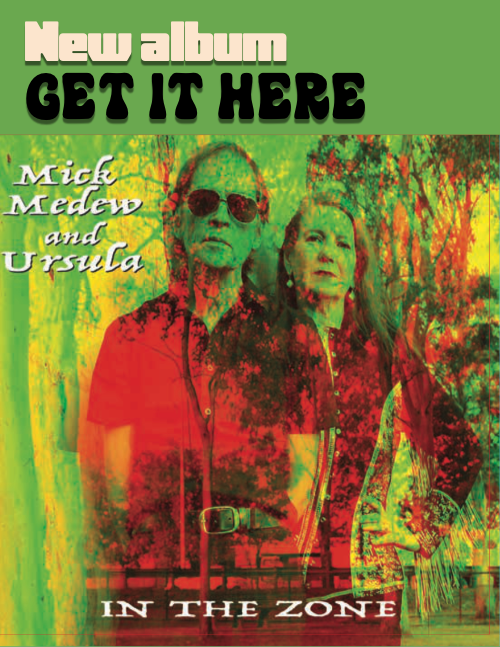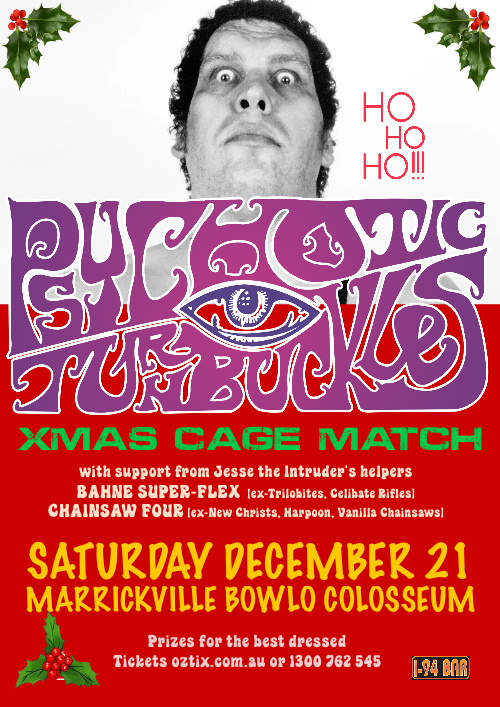
James McCann, the ramblin' man who's got a lotta moves
- Details
- By Patrick Emery
- Hits: 9800
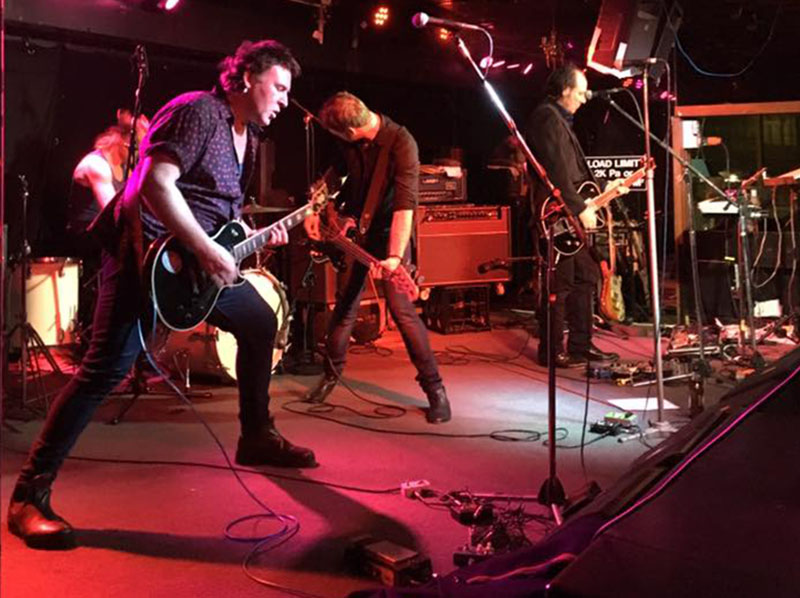 James McCann leads his New Vindictives through a set in Sydney.
James McCann leads his New Vindictives through a set in Sydney.
Before he was hanging out with The Drones in Perth, or touring through Europe with his own bands, James McCann cut his teeth playing in a local band in regional Western Australia. It was a baptism of fire, an experience that instilled in McCann a resilience that’s benefited him ever since.
“There’d be bikers, surfers, shearers, hippies, all mixing into one crowd, and fuckin’ getting’ shitfaced,” McCann says. “It could go real good, or it could go south really quickly. Heavy stuff would be happening, and you’d be up there watching. You had to hold your own.
"So by the time we got to Perth, playing was a walk in the park! The whole of my music career since then has been easy, crowd-wise.”
McCann grew up in the Western Australian town of Albany, 400 kilometres south-east of Perth. McCann’s father had moved from Scotland to Australia in the 1950s. After marrying a local woman in Sydney, where McCann’s elder sister was born, the McCanns moved back to Scotland, where James and his younger sister were born.
Lucky 7 - Lyres (Munster)
- Details
- By The Barman
- Hits: 4026
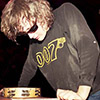 Never heard of Lyres? Consider this review an education. The rest of you with the remotest interest in the band or the seven-inch vinyl format should just scroll to the end and hit the Buy It link.
Never heard of Lyres? Consider this review an education. The rest of you with the remotest interest in the band or the seven-inch vinyl format should just scroll to the end and hit the Buy It link.
In the beginning, there was DMZ, a ‘60s-influenced Boston “punk” band of the late ‘70s who signed to the Bomp and then Sire labels..,and promptly fell off the edge of the earth.
They can find live recordings but a studio EP and a solitary eponymous album were their only recorded output during their brief lifespan (the latter spoilt by over-production - thanks Flo and Eddie!) DMZ were especially notable for two things: Recording a killer cover of “You’re Gonna Miss Me” and spawning Monoman, aka Jeff Connolly.
Connolly was the organist-vocalist for DMZ and a more ornery, irascible devotee of ‘60s rock and roll Nuggetism you’d be unlikely to uncover. His online outbursts on the old Bomp mailing list were the stuff of capslock legend. Within days of DMZ dissolving, he’d assembled a new band, Lyres. Other DMZ members would go on to play with The Cars and Ya Lo Tengo. Lyres have colaborated with the likes of the late Stiv Bators and Wally Tax (from Holland's wonderful Outsiders.)
Monoman (so called because of his predilection for the audio format) has a vocal not a million miles away from that of Roky Erickson. He’s been the one constant in countless line-ups of Lyres, some of which have contained DMZ members. Lyres live on today.
“Lucky 7” assembles 16 Lyres tracks over seven, 7” singles and is the last word in the garage rock revival scene (a term Connolly hates) of the 1980s. Most of the songs appeared on Ace of Hearts Records, the band’s Boston home. They’re compiled on an accompanying CD which is part of the box set, not a standalone at this stage. This review is being written from that.
Lyres - never “The Lyres” or the more heinous sin of “Thee Lyres” - made (and continue to make) wired, melodic, energetic, hooky, organ-propelled rock and roll. It’s peerless in its simplicity, soulfulness and freshness.
Its epitome is the first Lyres album, “On Fire” (1984), and especially the first side, where tremolo-edged gems like “Help You Ann” and “Don’t Give It Up Now” blow away anything else in the ballpark. It’s the peak but all the subsequent releases are worth your time of day.
A box set of singles is the ultimate vehicle for Lyres songs. All the greatest pre-download bands should be summed by their 7” singles. This set includes the band’s first recording, taken from an acetate of “How Do You Know?” And “It’s All Right”, put down a fortnight into their existence. These are rough recordings and largely of historical interest (the definitive “How Do You Know?” Is on disc two.) The other singles span the pre and post “On Fire” output.
You might know “She Pay The Rent” from the Nomads’ rather different cover. Great song either way you cut, it but Lyres’ version wins hands-down on economy. “We Sell Soul” brings up the rear on the final single and it’s a magnificent cover of a brooding song by Roky Erickson’s pre-Elevators band The Spades.
How often can you hold up a box set and say there isn’t a dud in the tracklist?





3D - The Catalogue - Kraftwerk (Klingklang/ Parlophone)
- Details
- By Robert Brokenmouth
- Hits: 4283
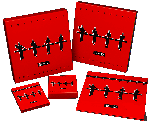 Get this, and get it good: If you’ve never heard Kraftwerk before, this stuff isn’t just rated five bottles out of five. This set, "3D - The Catalogue", is about 30 bottles out of five. Or a couple of kegs.
Get this, and get it good: If you’ve never heard Kraftwerk before, this stuff isn’t just rated five bottles out of five. This set, "3D - The Catalogue", is about 30 bottles out of five. Or a couple of kegs.
The first Kraftwerk record I ever heard was the single "Autobahn". I heard it on the radio, a surprise and rather freakish hit in 1975. Beyond that, I gave the band no more thought until I heard the LP "The Man Machine" at my mate Paul’s place, which prompted a continuous scurry around the second-hand record shops until I had everything I could find.
Can: The Singles - Can (Mute/Spoon Records)
- Details
- By Robert Brokenmouth
- Hits: 4246
 So, while a single a-side was supposed to get you up and interested, a B-side wasn’t. In fact, many bands - particularly mainstream bands - would plop dud choons on the B-side, convinced that no-one was listening.
So, while a single a-side was supposed to get you up and interested, a B-side wasn’t. In fact, many bands - particularly mainstream bands - would plop dud choons on the B-side, convinced that no-one was listening.
Nope. The fans were listening. And boy, did some fans get annoyed with the shit they found there. Why would your favourite band slip you sludge on the B-side? You pay good money, you expect a decent track on the flip.
Smarter (and poorer) bands began to use the B-side to their advantage - slipping in a cracking live rendition of a familiar song, or a joke or experimental track. Hell, a record costs money to make, you don’t want to spend all that just to waste the space on the flip. Hence The Damned’s crackling rendition of “Help!”, the Beatles song performed with kettle drums at a million miles an hour. Brilliance.
You Were There - Suzie Stapleton (self released)
- Details
- By Robert Brokenmouth
- Hits: 5574
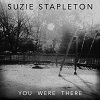 So why is a free downloadable single such a significant item?
So why is a free downloadable single such a significant item?
Because it’s not just a cheaper snapshot into an artist’s work. It can be an Instagram into an imaginary, lush and extraordinary world. The single worships the song itself, transforms it from one more song in a sequence (as with a CD or LP) and one more song in a set, and draws the song into greater, more concentrated focus.
Which means, when you hear something labelled a single, if it’s an old single, like from before the 1990s, you really do have to imagine the new owner playing the song over and over.
Punk Avenue: Inside the New York City Underground 1972-1982 by Phil Marcade (Three Rooms Press)
- Details
- By The Barman
- Hits: 7921
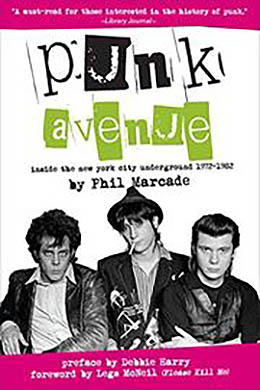 Phillippe Marcade was briefly drummer and then frontman for long-running New York City band The Senders, and a close confidant of many on the CBGB and Max’s Kansas City scenes.
Phillippe Marcade was briefly drummer and then frontman for long-running New York City band The Senders, and a close confidant of many on the CBGB and Max’s Kansas City scenes.
Born in France, for the most illegally living in NYC, he rode the rock and roll roller coaster as hard as anyone in Lower Manhattan.
“Punk Avenue” - the title is a play-on-words reference to the Park Avenue location of Max’s - is a fantastic read. There are no dead spots; Marcade tells his story colourfully, underlined by droll, self-deprecating humour.
Oh, Canada! Fleshtones are still Bigger and Better than we'll ever be
- Details
- By Dave Champion
- Hits: 6650
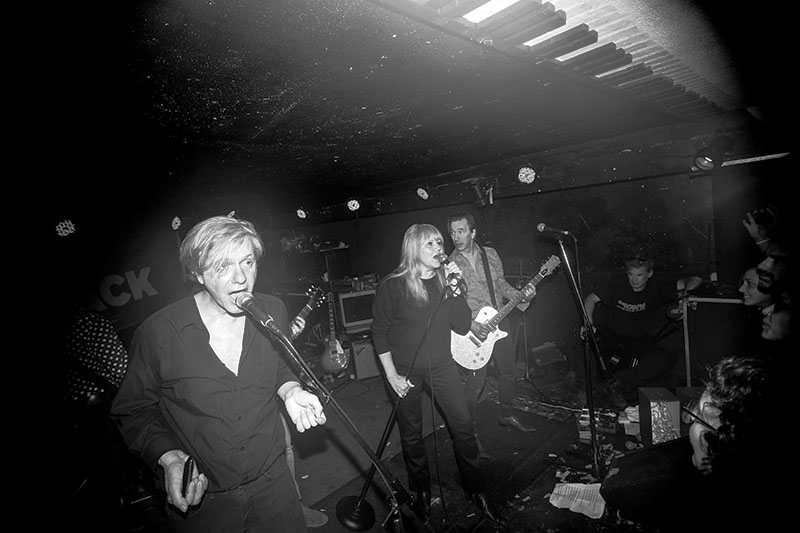 The Fleshtones joined by Miriam Linna (and Dave Champion at right of stage) . Photo: LePetitRusse
The Fleshtones joined by Miriam Linna (and Dave Champion at right of stage) . Photo: LePetitRusse
The “Wheel of Talent” was spinning in northern Ontario, Canada, baby. Oh yeah!
I very rarely open the newsletters and catalogs I get from various labels and bands but for some reason I was drawn to this month’s from Norton Records.
What do I see but that the mighty Fleshtones are playing two hours from home. And Sudbury hometown girl, Miriam Linna (head honcho at Norton Records, ex-Cramps drummer and solo artist in her own right), was going to be joining them. On stage. So, yeah, I had to go.
How Did I Find Myself Here? – Dream Syndicate (Epitath/ANTI)
- Details
- By The Barman
- Hits: 4525
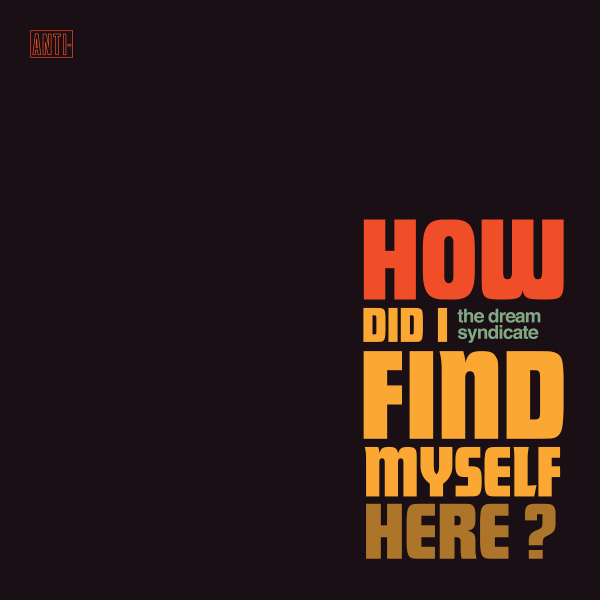 This is a review of an album by a band regarded as leaders of The Paisley Underground movement of the 1980s, written by someone who never bought into that scene.
This is a review of an album by a band regarded as leaders of The Paisley Underground movement of the 1980s, written by someone who never bought into that scene.
Genres are a device to apply easily understood descriptors so other people know what you’re talking about. They’re hard to avoid if you want to communicate meaningfully but all the same, they’re annoying because they infer boundaries. Deal with it.
“How Did I Find Myself Here?” is a rock and roll record. It gets you to a place and takes a path less obvious than most bands (reluctantly) wearing a label.
Warm reception as The On and Ons welcome us aboard
- Details
- By The Barman
- Hits: 5831
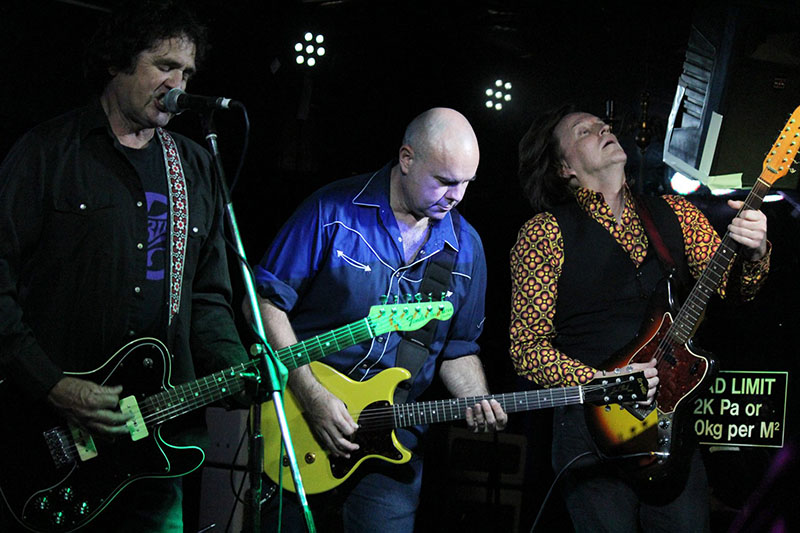 The On and Ons Glenn Morris and Jon Roberts with guest guitarist Murray Cook . Shona Ross photo
The On and Ons Glenn Morris and Jon Roberts with guest guitarist Murray Cook . Shona Ross photo
At the risk of stating the bleeding obvious, this was a night of three contrasting but not dissimilar bands when The Smart Folk, Loose Pills and The On and Ons weaved their guitar pop web over Marrickville Bowling Club. It was also the album launch for The On and Ons' wonderful CD "Welcome Aboard".
These sorts of night are infrequent in Sydney these days. Ones where the bands on the bill complement each other and the venue doesn't turn people off, so they turn out in good numbers.
You’re here to read a live music review? Hang in there. There's a bit of preaching to go through, first...
- Ain't that cool? Another Aints show, supports announced
- Leave Home Deluxe Edition – Ramones (Rhino)
- They Just Want Their Fun: Why Exploding White Mice will walk again
- This is the Modern World
- Love is a Gamble - Steve Wernick Band (RPM Records) & Cold Mother Night - Tom Redwood (Walking Bird Records)
- Rarebits - Fast Cars (Methodmusic)
Page 176 of 281

